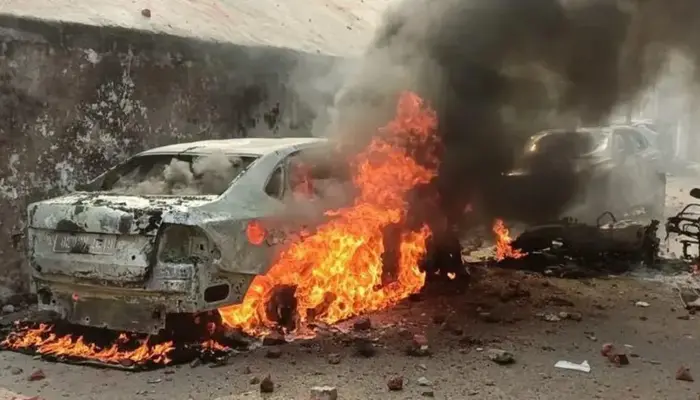Deadly violence erupted in Sambhal, Uttar Pradesh, over a court-ordered survey of the Shahi Jama Masjid, a historic Mughal-era mosque. This “mosque survey controversy” has reignited tensions between Hindu and Muslim communities. At least four Muslim men were killed during clashes, and authorities have taken strict measures to prevent further unrest.
Violence and Loss of Lives
The unrest began when locals opposed the second survey of the mosque, suspecting it was an attempt to undermine their religious rights. Protesters clashed with police, leading to stone pelting, tear gas deployment, and gunfire. Victims of the violence included Naeem, Bilal, Noman, and a 19-year-old who later succumbed to injuries. At least 16 police officers sustained serious injuries.
Videos from the incident show vehicles in flames and intense confrontations between police and protesters. These events mirror the 1992 Babri Mosque controversy, which led to communal violence across India.
Tightened Security Measures
To control the situation, the government imposed strict measures in Sambhal. Schools and colleges were shut, public gatherings were banned, and internet services were suspended. Authorities prohibited outsiders and political representatives from entering the district without permission until November 30. Sambhal police have filed cases against over 2,000 individuals and arrested 25, including local MP Zia-ur-Rehman Barq, who denied accusations of inciting violence.
Controversial Mosque Survey
The survey stems from a petition alleging the mosque was built over a Hindu temple. Thus, the petition, led by a pro-Hindutva lawyer, received court approval, sparking opposition from the local Muslim community. Many criticized the survey as hasty and biased, claiming it violated their rights.
The first survey on November 19 was completed peacefully, but the second attempt on November 24 faced resistance. Protesters accused the government of using the survey to provoke religious discord.
Political and Legal Responses
Opposition parties condemned the violence, blaming the ruling Bharatiya Janata Party (BJP) for inciting hatred. Former Uttar Pradesh Chief Minister Akhilesh Yadav called the unrest “unfortunate,” while Congress demanded a judicial inquiry.
Asaduddin Owaisi, leader of the All India Majlis-e-Ittehadul Muslimeen party, labeled the police action “murder” and criticized the court’s decision to conduct the survey without hearing the mosque’s caretakers. Other lawmakers denounced the survey as a violation of the Places of Worship Act 1991, which protects the status of religious sites as of August 15, 1947.
Read: American Universities to Face Uncertain Future
Broader Implications
The mosque survey controversy highlights India’s ongoing religious tensions. Hindu nationalist groups, emboldened under Prime Minister Narendra Modi’s leadership, claim several mosques were built over Hindu temples during the Mughal era. However, critics argue such actions undermine India’s secular framework.
The events in Sambhal underscore the fragility of communal harmony in a nation where historical grievances continue to fuel conflicts. Furthermore, the government’s handling of this crisis will be closely watched as communities seek justice and resolution.
Follow us on Google News, Instagram, YouTube, Facebook,Whats App, and TikTok for latest updates
